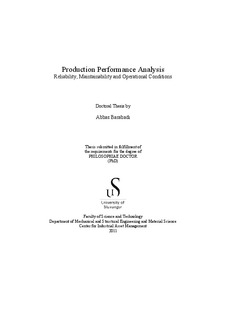| dc.contributor.author | Barabadi, Abbas | |
| dc.date.accessioned | 2011-12-05T07:45:20Z | |
| dc.date.available | 2011-12-05T07:45:20Z | |
| dc.date.issued | 2011-11-28 | |
| dc.identifier.citation | Production Performance Analysis : Reliability, Maintainability and Operational Conditions by Abbas Barabadi, Stavanger : University of Stavanger, 2011 (PhD thesis UiS, no. 144) | no_NO |
| dc.identifier.isbn | 978-82-7644-471-1 | |
| dc.identifier.issn | 1890-1387 | |
| dc.identifier.uri | http://hdl.handle.net/11250/183203 | |
| dc.description | PhD thesis in Offshore technology | no_NO |
| dc.description | This thesis is based on the following papers, not yet available in UiS Brage due to copyright: | |
| dc.description | PAPER 1: Barabadi, A. and Markeset, T. (2011). Reliability and
maintainability performance under Arctic conditions,
International Journal of Systems Assurance Engineering and
Management, DOI 10.1007/s13198-011-0071-8. | |
| dc.description | PAPER 2: Barabadi, A., Barabady, J. and Markeset, T. (2011). A
methodology for throughput capacity analysis of a production
facility considering environment condition, Reliability
Engineering and System Safety, Vol. 96, No. 12, pp. 1637-1646.
http://www.sciencedirect.com/science/article/pii/S0951832011001736 | |
| dc.description | PAPER 3: Barabadi, A., Barabady, J. and Markeset, T. (2011).
Maintainability analysis considering time-dependent and timeindependent
covariates, Reliability Engineering and System
Safety, Vol. 96, No. 1, pp. 210-217.
http://www.sciencedirect.com/science/article/pii/S0951832010001924 | |
| dc.description | PAPER 4: Kayrbekova, D., Barabadi, A. and Markeset, T. (2011).
Maintenance cost evaluation of a system to be used in Arctic
conditions: A case study, Journal of Quality in Maintenance
Engineering, Vol. 17, No. 4, pp. 320-336.
http://www.emeraldinsight.com/journals.htm?issn=1355-2511&volume=17&issue=4&articleid=1958855&show=abstract | |
| dc.description | PAPER 5: Barabadi, A. (2012). Reliability and spare part provision
considering operational environment: A case study, To appear in
International Journal of Performability Engineering, Vol. 8, No.
4, pp. 417-426. | |
| dc.description.abstract | With the increasing demand for energy over recent decades, the Arctic region has become an interesting area for future exploration and development for the
oil and gas industry. The Arctic region is known to have a harsh climate and a
sensitive environment in a remote location. The severe and complex
operational conditions in the Arctic can significantly affect the lifetime of a
system, the repair processes and the support activities. Hence, it is important
to consider the effect of the operational conditions on the performance of the
production facility/systems/equipment and machines, and the related
reliability and maintainability characteristics.
The aim of this thesis is to study, analyze and suggest a methodology for
production performance analysis considering operational conditions.
Furthermore, the study focuses on developing and modifying the available
statistical approach for prediction of maintainability performance and spare
part provision considering the effect of time-dependent and time-independent
covariates (influence factors).
In this research study, firstly a brief survey of technological and
operational challenges in the Arctic region from a maintainability and
reliability performance point of view is presented. Then, available statistical
approaches for reliability and maintainability performance analysis
considering the effect of covariates are reviewed. Thereafter, a methodology
is developed and proposed for production performance analysis considering
time-dependent and time-independent covariates. The methodology is based
on the concept of the proportional hazard model (PHM) and the proportional
repair model (PRM), as well as their extensions. A case study from the
mining industry is presented to demonstrate how the proposed methodology
can be applied.
In the second part of this research study, the application of the extension
of PHM is developed and discussed in order to predict the maintainability
performance considering time-dependent covariates. Furthermore, the existing
methods for calculating the number of spare parts on the basis of the
reliability characteristics, without the consideration of time-dependent
iv ABBAS BARABADI
covariates, is modified and improved to enhance their application in the
presence of time-dependent covariates. The applications of these methods are
demonstrated and discussed using a case study.
The result of the study shows that the operational conditions may have a
significant effect on the reliability and maintainability performance of a
component. This also consequently affects the number of the required spare
parts for a given operational condition. The result also shows that considering
time-dependent covariates as time-independent covariates may lead to wrong
results in the prediction of reliability and maintainability performance as well
as the required spare parts. Therefore, before any analysis, the timedependency
of covariates must be checked. Thereafter, based on the result of
the analysis, the appropriate statistical approach must be selected. | no_NO |
| dc.language.iso | eng | no_NO |
| dc.publisher | University of Stavanger, Norway | no_NO |
| dc.relation.ispartofseries | PhD thesis UiS;144 | |
| dc.rights | Copyright the author, all right reserve | |
| dc.subject | offshore teknologi | no_NO |
| dc.subject | production performerance | no_NO |
| dc.title | Production Performance Analysis : Reliability, Maintainability and Operational Conditions | no_NO |
| dc.type | Doctoral thesis | no_NO |
| dc.subject.nsi | VDP::Technology: 500::Materials science and engineering: 520 | no_NO |
